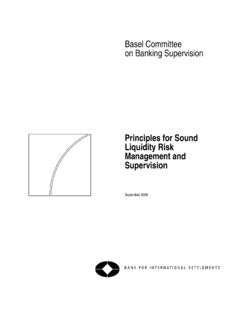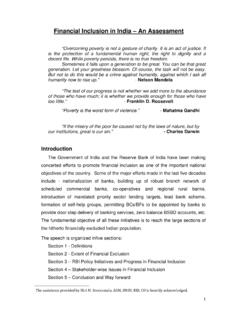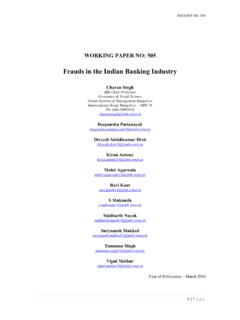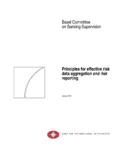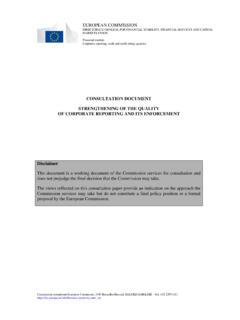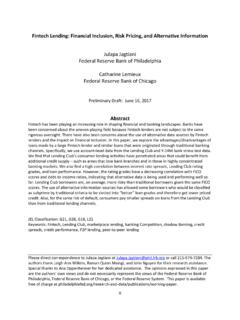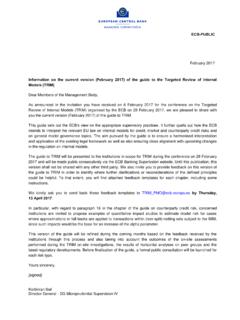Transcription of Financial Regulation and Supervision in Zimbabwe: An ...
1 I Financial Regulation AND Supervision IN ZIMBABWE: AN EVALUATION OF ADEQUACY AND OPTIONS John Nhavira Evengelista Mudzonga Everisto Mugocha ZEPARU Working Paper Series ii Contents EXECUTIVE SUMMARY .. v 1. INTRODUCTION AND BACKGROUND .. 1 A brief history of the Zimbabwe Financial system .. 4 Economic Structural Adjustment Programme .. 4 Conglomerates .. 5 Innovation .. 6 Offshore Accounts .. 6 Structure of the paper .. 9 2. ZIMBABWE S Financial REGULATORY AND SUPERVISORY SYSTEM .. 10 Ministry of 10 Reserve Bank of Zimbabwe .. 10 The Deposit Protection Corporation .. 11 The Securities Commission .. 11 The Insurance and Pensions 12 3. RATIONALE FOR Financial 12 Role of the Bank for International Settlement (BIS).
2 15 Theoretical perspectives of Regulation .. 20 Public Choice Theory, .. 20 Neopluralist Theory, .. 20 Public Interest Theory .. 20 Civic Republican Theory.. 21 International Best Practice: Evidence and Lessons .. 21 Empirics .. 21 iii Legal and political issues .. 21 Independence .. 22 Budgetary Issues .. 22 Accountability .. 22 5 International Trends .. 22 The curious case of Cyprus .. 25 Slovenia on the brink .. 26 4. HOW EFFECTIVE IS Regulation AND Supervision IN ZIMBABWE .. 27 Systemic Regulation .. 27 Deposit Insurance Corporation .. 28 Lender of Last 34 TABLE 3 ZIMBABWE Financial SOUNDNESS INDICATORS 2009- 35 Regulations .. 36 Conduct of Business Regulation .
3 38 5 Financial REGULATIONS AND CHALLENGES IN Supervision .. 47 Introduction .. 47 53 Macroprudential approach .. 53 Lessons .. 55 Globalisation .. 56 Derivative products .. 56 6 CONCLUSION AND POLICY RECOMMENDATIONS .. 56 Introduction .. 56 Prudential Regulator .. 58 Market Conduct Regulator .. 58 iv Standing Committee of Financial Regulators .. 59 Standing Committee on Financial Stability .. 59 National Credit Register .. 59 Guidelines or 60 Corporate Governance .. 60 Bank Capitalisation .. 60 Lender of last resort .. 61 7 EMERGING POLICY OPTIONS FOR POLICYMAKERS .. 61 Option one .. 62 Option two .. 62 Option three .. 62 Option four .. 62 Option five.
4 62 8 Further Areas of Research .. 63 v Acknowledgements ZEPARU acknowledges the Financial support provided by the Government of Zimbabwe, African Capacity Building Foundation (ACBF) and USAID Strategic Economic Research and Analysis Zimbabwe (SERA) Program under contract number USAID-613-C-11-00001, without which this study would not have been possible. This study is part of a broader set of studies on the Financial sector development in Zimbabwe commissioned by ZEPARU. The study team acknowledges the inputs from diverse stakeholders and colleagues who shared their insights and spared time to provide information and data that was used in this study.
5 Special thanks go to Professor Daniel Makina, Dr. Gibson Chigumira and Dr. Sehliselo Mpofu who reviewed various drafts of this paper during the research process. Comments from Mr. A Ncube of MEFMI and participants of the Financial sector studies dessemination workshop held on the 26th of July 2013 at Pandhari Lodge, Harare Zimbabwe are greatly appreciated. The findings of this study do not necessarily reflect the ZEPARU or its funding partners. The authors bear full responsibility for any factual errors and omissions. vi EXECUTIVE SUMMARY The purpose of this working paper is to critically review the Financial Regulation and its supervisory architecture in Zimbabwe and settle the question of whether it is still relevant and appropriate for Zimbabwe.
6 In this regard the study is focused on systemic, prudential and market conduct Regulation . Regulation refers to the rules that govern the conduct of intermediaries, whilst Supervision is the monitoring aspect undertaken by one or more public authorities in order to ensure compliance with regulations. In Zimbabwe there are five principal agencies charged with the responsibility of Financial Regulation and Supervision . These are the Reserve Bank of Zimbabwe (RBZ), The Ministry of Finance, The Deposit Protection Corporation, The Securities Exchange Commission (SEC) and The Insurance and Pensions Commission. Regulation is necessary to ensure consumer s confidence in the Financial industry.
7 There are three main reasons for Financial system Regulation : (i) to ensure system stability the safety and soundness of the Financial system; (ii) to provide smaller (individuals), retail clients with protection. Caveat emptor does not apply to Financial contracts due to their complex and opaque nature, and; (iii) to protect consumers against monopolistic exploitation. The deregulation of the Financial sector and emergence of new Financial instruments and services offered by Financial institutions has blurred boundaries between different types of Financial institutions such as banking , insurance and securities. In order to assess the effectiveness of Regulation and Supervision in Zimbabwe, we examine the state of three types of Regulation : systemic, prudential and conduct of business Regulation .
8 A silo-based approach as currently exists in Zimbabwe encourages a blinkered approach to Regulation and Supervision . The global Financial crisis of 2007-2009 has renewed interest in a macro prudential approach to Regulation which involves the analysis of macroeconomic trends and how they impact prudential soundness and the stability of Financial firms and the Financial system. Moreover, the enormous costs of the crisis have forced governments across the globe to reconsider how they approach Financial sector Regulation . Zimbabwe should not be the exception. In conclusion the purpose of this working paper was to critically review the regulatory and supervisory regime of the Financial system in Zimbabwe and to settle the question of whether it is still relevant for Zimbabwe at this time.
9 It was also observed that there was an absence of a guiding vision for the Financial services sector. vii The evidence points to the fact that the regulatory and supervisory system is no longer relevant for Zimbabwe as indicated by, inter alias: bank failures due to corporate governance failures, betrayal of fiduciary responsibilities and loss of public confidence in the system brought about by the hyperinflationary episode of 2006-2009. Furthermore, the cause of bank failure may be attributed, in the majority of instances, to a failure of prudential Regulation . Most significantly, the Financial system has changed through innovations as managers seek to maximize profits through conglomeration.
10 In light of the conglomeration of the Financial system and in order to address shortcomings in the regulatory architecture, it is recommended that Zimbabwe consider and adopt one of five options: option (one) calls for policymakers to do nothing; option two requires correcting the weaknesses identified in the various pieces of legislation such as the Deposit Protection Corporation Act,, the Reserve Bank of Zimbabwe Act, the banking Act 2000 and most importantly, urgently incorporating prudential regulations and guidelines (Basel II and III) into the banking Act; option three calls for implementing option two and implementing the Integrated Approach; option four calls for implementing option two, then option three- the Integrated Approach and in the long-term implementing the twin peak model.
